The Concept of Civilisation
Origins of the word
Civilisation may seem like an impartial concept as just another word in the English language. But the connotations of the word, and its use in archaeology, are rightfully contentious if you look deeper. The origins of the term in English relates to the French word civilisé, meaning 'civilised', which itself derives from the Latin civilis ('civil'). The Latin term is associated with civis, 'citizen', and civitas, 'city'.
 |
| M. Gossler 2005, Wikimedia Commons. |
The Eurocentrism inherent in the term 'civilisation' is clear when considering the history of this word. The ancient Romans contrasted themselves, who they viewed as civilis (civil), with non-Roman groups who were seen as being inferior or uncivilised. The ancient Greek term barbaros, used to refer to non-Greek speaking people of other cultures, was later adopted in Latin during the time of the Roman Empire. It is from this word that the English term barbarian is derived, with the negative connotations it encompasses when referring to foreigners or the Other (as separate from the Self). In philosophy and anthropology the Other refers to those belonging to a group different to oneself and portrays alternate characteristics to the group that the Self belongs to, often serving to dehumanise the Other to justify certain behaviours. You can find more information about the Other here. In this way, civilisation and barbarism have been contrasted as opposites from ancient times up to today.
 |
| Florence Lawrence in Ingomar the barbarian (1908), Wikimedia Commons. |
The 'Age of Exploration'
During the so-called 'Age of Exploration', the period from the 15th century onward when Europeans, starting with the Portuguese, the Dutch, and later the English, journeyed to lands beyond the "Old World" (Europe, Asia and Africa). The people that they encountered in the Americas and Australia did not fit with the idea of culture and civilisation that Europeans held as a remnant of the Roman period and revived in the Renaissance. As a result, the people Indigenous to the "New World" were viewed as primitive and uncivilised, contrasting with the perceived cultural superiority of European civilisation.
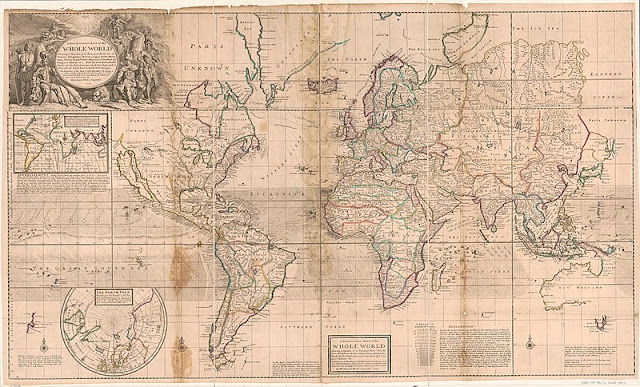 |
| H. Moll 1719. A new & correct map of the whole World (link here) |
Missionaries and officials who travelled to these continents from Europe intentionally attempted to wipe out Indigenous cultures and to bring these "primitive" people to a civilised, Christian way of life. It goes without saying that this extremely racist point of view has immensely damaged the ways of life and wellbeing of Indigenous peoples around the world, much of which stems from the concept of civilisation itself.
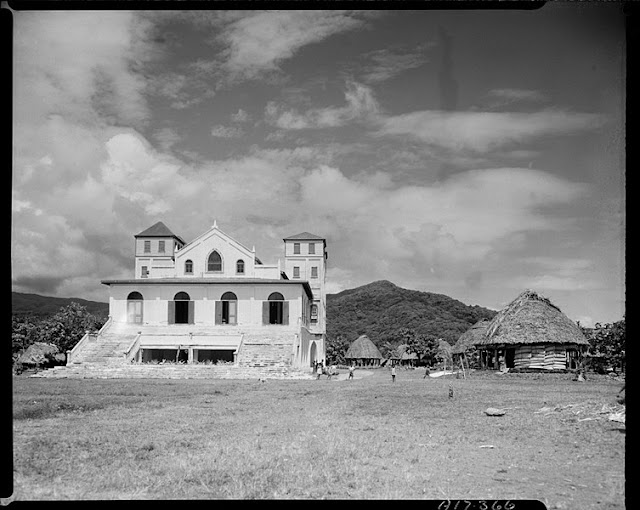 |
| W. Walker 1949, Archives New Zealand. London Missionary Society in Samoa. Archives Reference: AAQT 6401 Box 6/ A17366 |
The Archaeological Perspective
The origins of archaeology are intertwined with these Eurocentric notions, with the discipline emerging during the same period as the 'Age of Exploration', when Europeans were being exposed to cultures and societies vastly different to their own. This era of increased travel for the wealthy and well-off fostered collection of antiquities and cultural artefacts from around the world, many of which were removed from their countries of origin and are now still held in museums around the world as reminders of the colonial beginnings and ongoing complexities of the study of archaeology. The British Museum contains thousands of artefacts from different parts of the world, with famous examples including the Rosetta Stone from Egypt (pictured below) and marble sculptures from the Parthenon in the Athenian acropolis, which still remain in the museum despite continued attempts by the Greek government to have the sculptures returned.
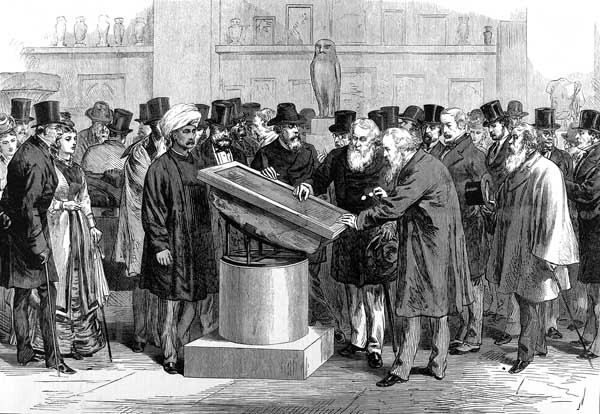 |
The Rosetta Stone on display in the British Museum in 1874. By Unknown author - Illustrated London News, Public Domain (link here). |
As part of early antiquarianism, European-led archaeological excavations in the Middle East and North Africa took place and theorisation about the human past was an intellectual and academic endeavour. The ancient societies of Mesopotamia and Egypt were uncovered and deemed civilisations due to their monumental architecture and wealth, which was viewed as comparable with the ancient Greek and Roman civilisations.
 |
| The Egyptian Expedition under the Orders of Bonaparte, L. Cogniet 1798 (link here). |
Early archaeological theorists included the Sydney-born Australian archaeologist Vere Gordon Childe, who in the early 20th century proposed ten characteristics of civilisation in his article in Town Planning Review:
- Urban settlement
- Full time specialisation of labour
- Surplus of production (economic surplus)
- Monumental public buildings
- A ruling class of civil, military and religious leaders - hierarchical social structure
- Writing
- Scientific knowledge and rational thinking
- Highly developed art
- External trade
- State organisation
Based on this criteria, in addition to ancient Greece and Rome, and later the ancient Egyptian and Mesopotamian societies, the status of civilisation was allocated to the ancient Chinese, Mesoamerican societies, and the Indus Valley or Harappan peoples who I study.
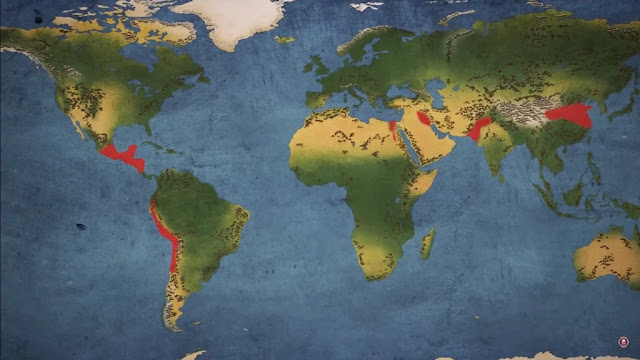 |
| 'The 6 Cradles of Civilisation' 2018 (link here) |
Although the use of 'civilisation' to refer to these ancient societies may seem harmless, when considered in the historical context of its etymology and Eurocentrism, the negative connotations for societies that are not deemed to be 'civilisations' is clear. Groups that are excluded from this classification are automatically labelled as the opposite, uncivilised, which is associated with other negative terms that you can see in a simple Google search for the antonym (opposite) of 'civilisation'.

Moving forward in archaeology, as the discipline's problematic beginnings are critiqued and cultural competency is increasingly valued, we should strive to move beyond categorisations such as 'civilisation' to more holistic, non-judgemental systems of interpreting the human past.
Civilization - An example from popular culture
The video game Civilization, launched in 1991 and now on its 6th installment, provides an example of the changing nature of the concept of 'civilisation'. The gameplay requires players to choose a civilisation which they will lead in the areas of urban development, exploration, government, trade, research, and military to conquer all the other civilisations. Starting in its initial version with societies more commonly considered 'civilisations', options for players included the Greeks, Romans and Egyptians, as well as more recent societies including the Americans and Russians.
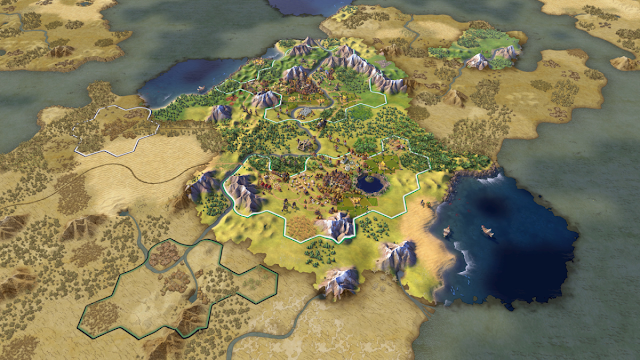 |
| K. Tharoor 2016 (link here) |
Over time the Western and Eurocentric emphasis of the game has shifted, with the inclusion of increasingly diverse societies to choose from, such as the Maori, Thai, Native American, Cuban, and Malian. In various iterations the Sioux and Iroquois, two groups of First Nations peoples in North America, can be played separately from the Native American grouping.
However, the game still demonstrates the prejudices and Western-oriented nature of 'civilisation', with later editions including an Australian civilisation led by World War 2 Prime Minister John Curtin. The choice to make the Australian civilisation one centred on colonial White Australia, rather than any one of the hundreds of Indigenous Australian societies across the continent, is symbolic of the loaded nature of the term.
Despite this, the game was designed primarily to serve entertainment purposes, presenting a strategy game within a context of world history that highlights developments perceived as significant in the human past, while providing the opportunity for players to lead their chosen civilisation through stages that may be very different from historical reality. In practicality, the way that the game plays out leads to the Western ideal of modernity, similar to the USA in the late 20th and early 21st century, despite the initial civilisation that is chosen by the player as this is the only path of "advancement" envisioned within the game. In this way, notions of civilisation and modernity in popular culture are influenced by the privileging of Western perspectives at the expense of alternate points of view. More information about Civilization and the developer's perspectives can be found here.
Within the game the chosen civilisation is pitted in opposition to barbarians who aim to destroy what the civilisation is building. In this way the game serves as an allegory for the early ideology of the concept 'civilisation' and can serve to encourage critical consideration of this term and what it implies. Whether or not we leave behind the term 'civilisation' in archaeology and beyond, critical exploration of the ways we define societies will propel us to better understand the world around us.


Comments
Post a Comment